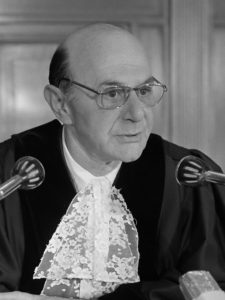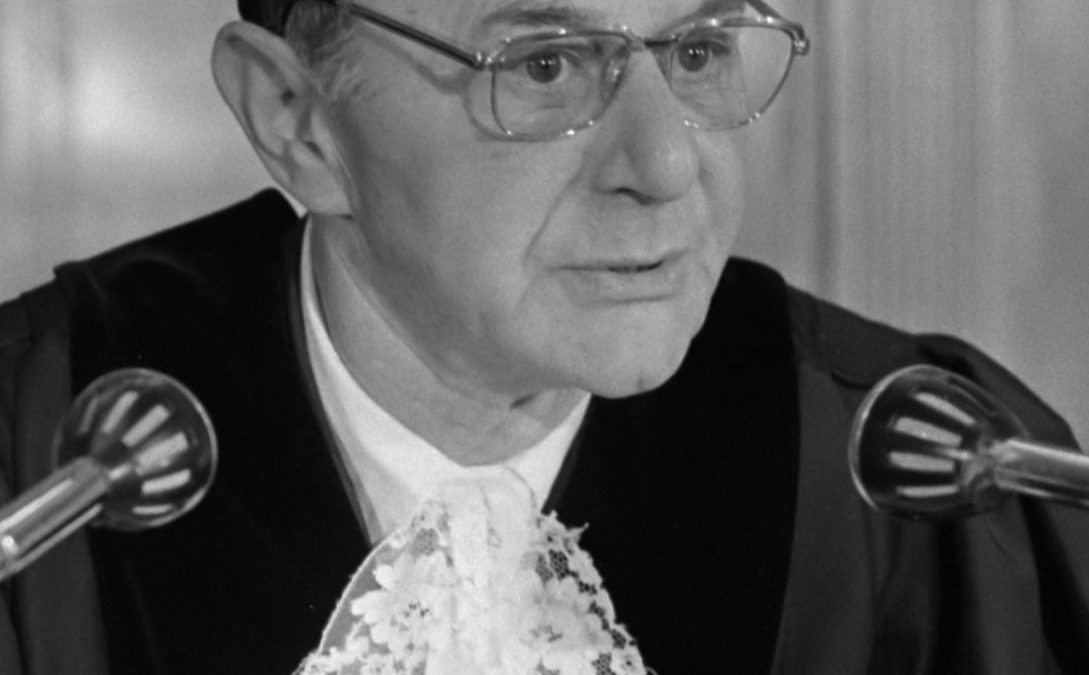
Manfred Lachs (1914 – 1993) was born in a Polish-Jewish family at the end of a period where Poland had been wiped from the map, with its territory divided between the Austro-Hungarian Empire, Russian Empire and Prussian Kingdom. When he was 4 years old, Poland regained its independence after 123 years of partition. Not only it was a period of recovery in Europe following the devastation of World War I, but at the same time it can be perceived as a birth of new Poland, with all the consequent legal and political transformations of such a complicated situation. The new state was extremely heterogeneous in the context of wildly different administrative and legal systems, knowledge of languages, and the situation of minorities. The state had to be built anew. At the same time, it offered a chance for people like Stefan Glaser, Rafael Lemkin, and Lachs to observe the changing perspective of a newly formed state and to take part in it.
Lachs graduated from the Jagiellonian University in Cracow in 1935, where he also received a doctorate in 1937. In 1939 he received doctorates from the Nancy and Moscow universities. Before the Second World War, he studied at the London School of Economics and Cambridge University, and this international position meant that he avoided being murdered during the Holocaust, while members of his family were killed during the German occupation in Poland.
After WWII ended, Lachs was engaged in the works of the United Nations War Crimes Commission as the delegate of the Polish government, and later took part in the prosecution of Nazi criminals in Nuremberg (he was one of the authors of the indictment that referred to Nazi crimes committed in Poland). Additionally, in 1945 he published a book titled War crimes. An attempt to define the issue where he reconstructed the notion of war crimes from the previous international practice and documents. In the following years he was a member of the Sixth Legal Committee working on the Genocide Convention, and an active participant of the Polish delegation during UN negotiations over the text. These events marked the beginning of his long, international career, from participating in international fora as a Polish delegate, to a judge at the International Court of Justice (1967-1993). However, his research interests were not only limited to the ICL, they included, inter alia, treaty law, the international obligations of states, border disputes, space law, outer space, and even teaching international law. At the same time, he practiced law in four different roles: those of academic scientist, teacher, diplomat, and international judge.
Lachs’s work as an academic teacher and scientist related to work at Warsaw University, where he was a professor of public international law, and the Institute of law studies of the Polish Academy of Science (which from the late 1970s until the early 1990s operated under an alternative name as the Institute of Law and State); between 1961 and 1966 he was also a director of the Institute. He also supported Polish scholars abroad, as a founder of the scholarship for Polish participants at the summer courses of the Hague Academy of International Law [as specified in his will, following his death a foundation was created to honour the authors of the best books published in Poland concerning public international law]. At the same time, he authored 14 books and more than 130 scientific articles.
As a diplomat, Manfred Lachs served as the Polish representative in the Sixth Legal Committee of the UN General Assembly (being chairman in 1949, 1951, 1955), and was a member of the International Law Commission (1962-1966). As advisor to the Polish Minister of Foreign Affairs, Adam Rapacki, he was also one of the authors of the Rapacki Plan, which promoted the idea of the suspending nuclear testing and creating a nuclear-free zone in Central Europe. Later he took part in the UN Disarmament Committee, which prepared The Treaty on the Non-Proliferation of Nuclear Weapons. Lachs also acted as a chair of the Legal Sub-Committee on the peaceful uses of Outer Space, and in 1967 passed this role on to Eugeniusz Wyzner, following Lachs election as a judge of the ICJ where he served for 26 years (between 1973-1976 he was President of the Court) being one of the longest serving judges in the history of the Court. He took part in many broadly cited judgements and advisory opinions; what creates the clearest impression of him as a judge is the fact that he dissented only twice, as he always tried to build the majority. In 1984, in the case of Nicaragua he attached a separate opinion to the judgement in which he reconstructed the role of a judge. Interestingly, it was an opinion also on how he saw his personal mission in this role. The context was political, but the tone of the opinion was universal and deeply inclusive. He assumed judicial impartiality, unbiased character and objectivity. At the same time, he noticed that judges may represent different schools of law, conflicting philosophies, and even characters, but at the same time in his opinion this was a strength of the judicial bench. Lachs wrote: “(…) whatever philosophy the judges may confess they are bound to "master the facts" and then apply to them the law with utmost honesty. As human beings, judges have their weaknesses and limitations ; however, to be equal to their task they have to try to overcome them. Thus in both their achievements and shortcomings they must be looked upon as individuals : it is their personality that matters”.
At the same time he perceived the judgments of the Court as allowing for “a constructive contribution to the resolution of a dangerous dispute - paving the way to stability in a region troubled for decades by conflict and confrontation” and he assumed that the Court “can make contributions in many other cases and resolve controversies which trouble good relations between States”. This specifically mirrors how he saw the role of international law – as a forum to calm disputes and controversies between states and serve the interests of the international community.
Karolina Wierczyńska (Institute of Law Studies, Polish Academy of Sciences)
Bibliography
-
M. Lachs, La Cour International de Justice dans le monde d’ajourd’hui, Bruxelles 1975
-
M. Lachs, Le problem de la revision de la Charte des Nation Unies, Paris 1957
-
M. Lachs, Le Monde de la pensée en droit international :theories and pratique, Paris 1988
-
M. Lachs, Le Traite de Varsovie du 14 Mai 1955, London 1955
-
M. Lachs, The Polish-German Frontier. Law, life and logic of history, Warsaw 1964
-
M. Lachs, The Law of Outer Space (An Experience in Contemporary Law-Making), Leiden 1972


